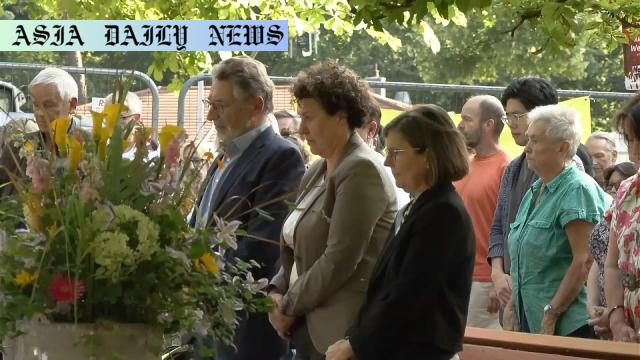Atomic Bombings: Memorial ceremony in Potsdam reflects on Hiroshima and Nagasaki, encouraging people to confront nuclear weapon threats.
- Key Point 1: Commemorative ceremony held in Potsdam marks 80th anniversary of the Hiroshima and Nagasaki bombings.
- Key Point 2: The event, held at the Hiroshima-Nagasaki Square, involved laying of flowers and origami cranes as a tribute to the victims.
- Key Point 3: The monument prompts reflection on nuclear weapons and their consequences, fostering awareness about historical tragedies.
- Key Point 4: Participants emphasized preventing such atrocities in the future by educating future generations.

Remembering the Tragedy: A Ceremony in Potsdam
The German city of Potsdam became a center of historical reflection and remembrance on Friday, marking the 80th year since the issuance of the order for the atomic bombings of Hiroshima and Nagasaki. The solemn memorial ceremony took place near Berlin at Hiroshima-Nagasaki Square, directly in front of the building where then-US President Harry Truman stayed during the pivotal Potsdam conference of 1945. This meeting shaped the post-war landscape, ultimately leading to the devastating use of atomic weapons in Japan.
Participants, including locals, activists, and historians, paid their respects by laying flowers and folding origami cranes at a monument that holds great symbolic resonance. This monument, composed of a streetcar flagstone from Hiroshima and a stone from a temple in Nagasaki, serves as a haunting reminder of the destructive power of nuclear warfare and the enduring legacies left behind in Japan. With a moment of silence, attendees honored the approximately 200,000 lives lost in the immediate aftermath of the bombings and pledged to keep their memory alive.
The Power of Memorials: Fostering Reflection
Memorials like the one in Potsdam play a powerful role in prompting individuals to reflect on the horrors of war and the catastrophic consequences of nuclear weapons. As one participant poignantly expressed, the site provides a unique opportunity for parents to teach their children about the historical event and foster a commitment to peace. By doing so, families can collectively ensure such atrocities do not recur.
Fukumoto Masao, a member of the civic group responsible for organizing the ceremony, emphasized the role of the monument in encouraging ongoing dialogue about nuclear disarmament. “We hope this space pushes people towards critical thinking about nuclear weapons and their impact,” he said. Such spaces act as ever-present reminders of humanity’s capacity for both destruction and resilience while encouraging global discourse on peace and disarmament.
Lessons from History: Preventing Future Atrocities
The events of 1945, culminating in the devastation of Hiroshima and Nagasaki, offer a stark lesson on the destructive potential of war and the importance of diplomatic solutions. The commemoration of these events is critical to ensuring the world does not forget the grievous consequences of the decisions made during wartime. Despite the passage of 80 years, the legacy of these bombings continues to educate and impact individuals worldwide, underscoring the need for international collaboration to prevent such tragedies from happening again.
Educators, policymakers, and activists wield a powerful role in this mission, focusing on reducing nuclear arsenals and fostering a culture of peace. As global conflicts and geopolitical tensions continue to pose risks, the memory of Hiroshima and Nagasaki highlights the urgency of peace-building efforts. It is a call to action for individuals and countries alike to commit to nonviolence and accountability.
Looking to the Future with Hope and Resolve
This commemoration in Potsdam is about more than just honoring the past—it is a clarion call for the future. The ceremony emphasized educating younger generations about the consequences of nuclear weapons while inspiring hope for their abolition. It highlighted the need for global unity and a shared commitment to ensuring nuclear weapons are never again used. Monuments like the Hiroshima-Nagasaki Square serve as pivotal tools for awareness, reflection, and progress. As participants laid flowers at a site rooted in tragedy, they reaffirmed their shared humanity and resilience, providing hope for a more peaceful future.



Commentary
Potsdam’s Legacy in Context
The choice of Potsdam as the site for a commemorative ceremony is deeply symbolic, as it was here that key decisions determining the fate of the post-war world were made. President Harry Truman’s role, in particular, adds a complex layer of history to the ceremony. It reminds us all of the profound responsibility leaders hold, as their decisions carry the weight of unimaginable consequences. Today, remembering such historical moments in places of decision-making underscores the importance of learning from these choices and striving for a better future.
The Role of Education in Preventing Future Atrocities
As the ceremony demonstrated, educating the young generation plays a pivotal role in ensuring history doesn’t repeat itself. When parents and educators take the time to explain the past, they lay the foundation for a peace-conscious society. Not only does this education involve recounting historical events like the bombings, but it also includes exploring the ethical ramifications of those choices and encouraging critical thinking about conflict and peace. This ripple effect can create a mindful and aware generation who stands for global harmony.
The Global Need for Nuclear Disarmament
The Potsdam ceremony also highlights the urgency of nuclear disarmament in today’s volatile geopolitical climate. The devastation wrought by the bombings of Hiroshima and Nagasaki stands as irrefutable evidence of the dangers of nuclear arms. This ceremony was not just a moment of remembrance but a call to action. By building awareness and advocating for disarmament, it gave hope that global consensus can eventually eliminate such catastrophic weaponry. It is imperative that nations across the world prioritize dialogue and agreements to secure a safer tomorrow.